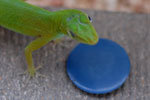A new study in Biology Letters has found that warmer temperatures may make lizards smarter, even as past studies have linked a global decline in lizards to climate change.
Looking at Australia’s Eastern three-lined skink (Bassiana duperreyi), researchers found that warm temperatures during incubation not only resulted in larger individuals (a result confirmed in previous research) but perhaps more clever ones as well.
To test the lizards’ smarts, scientists incubated two sets of lizards: 9 in cold temperatures and 12 in warm. Then the researchers placed the lizards in a plastic container with two exits, one of which was blocked by see-through Plexiglass. The researchers then frightened the lizard by touching their tails. Those incubated in warmer temperatures learned quicker than the others to avoid the exit blocked by Plexiglass.
“Climate change might not be so bad for these guys,” Joshua Amiel, lead author, said in a press release.
However, 2010 study in Science estimated that 20 percent of the world’s lizard species could go extinct due directly to climate change impacts. The massive study looked at declines in 34 different lizard groups over five continents. The study found that hot days meant lizards spent more time in the shade and less time foraging, this was particularly bad news for breeding.
“The heat doesn’t kill them, they just don’t reproduce,” co-author Jack Sites, a biology professor at Brigham Young University. “It doesn’t take too much of that and the population starts to crash.”
People don’t often think of lizards as ‘smart.’ But recent research has shown researchers that lizards may be smarter than expected perhaps even equal to birds. A study last year, also in Biology Letters, found that Puerto Rican anole, a type of lizard, can match birds in intelligence tests. The lizards were capable of solving a problem they’ve never encountered before, remembering the solution in future trials, and even changing techniques when presented with new challenges.
CITATION: Joshua J. Amiel and Richard Shine. Hotter nests produce smarter young lizards. Biology Letters. 2012.
Related articles
Brainy lizards rival birds in intelligence

(07/13/2011) Reptiles have long been thought to be dim-witted, but a new study in Biology Letters finds that the Puerto Rican anole, a type of lizard, can match birds in smarts. Using cognitive tests that have been previously used on birds, researchers with Duke University found that the lizards were capable of solving a problem they’ve never encountered before, remembering the solution in future trials, and even changing techniques when presented with new challenges. In fact, the tiny anoles solved the test with fewer tries than birds. Given reptiles’ reputation of being slow-on-the uptake the head author, Manuel Leal, said the findings are ‘completely unexpected’.
Climate change devastating lizards worldwide: 20 percent estimated to face extinction

(05/13/2010) Lizards have evolved a variety of methods to escape predators: some will drop their tail if caught, many have coloring and patterning that blends in with their environment, a few have the ability to change their colors as their background changes, while a lot of them depend on bursts of speed to skitter away, but how does a lizard escape climate change? According to a new study in Science they don’t. The study finds that lizards are suffering local extinctions worldwide due exclusively to warmer temperatures. The researchers conclude that climate change could push 20 percent of the world’s lizards to extinction within 70 years.
Climate change could devastate lizards in the tropics

(03/04/2009) With help from data collected thirty years ago, scientists have discovered that tropical lizards may be particularly sensitive to a warming world. Researchers found that lizards in the tropics are more sensitive to higher temperatures than their relatives in cooler, yet more variable climates. “The least heat-tolerant lizards in the world are found at the lowest latitudes, in the tropical forests. I find that amazing,” said Raymond Huey, lead author of a paper appearing in the March 4 Proceedings of the Royal Society B.